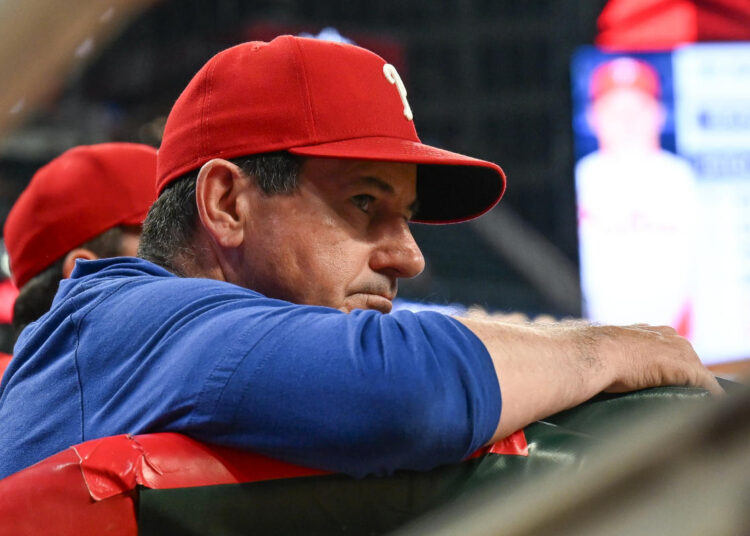What is Rob Thomson’s focus the final three weeks of Phillies’ season? originally appeared on NBC Sports Philadelphia
The Atlanta Braves were a juggernaut last year. Won 104 regular season games. Bashed 307 homers. Cruised to their sixth straight division championship. Fat lot of good it did them in October when they were eliminated in the division series.
The 101-win Orioles and the 100-win Dodgers were also dismissed in that round. A suspicion took root that the new playoff format, which awards a first-round bye to the four best teams, might not be an advantage after all. Days off are a good thing. Too much of a good thing, though, can lead to lost rhythm and momentum.
“I’m not going to say that’s an excuse for us,” Braves manager Brian Snitker said in the mediate wake of being bounced by the Phillies. “But it’s not ideal … It’s hard, you know, when you’re in an everyday sport. I never liked two days off. I think one is plenty. But you know what? It is what it is, and we gotta figure it out.”
With exactly three weeks remaining on this season’s schedule, Phillies manager Rob Thomson is trying to figure it out.
The Phillies haven’t clinched anything yet. But even after being drubbed, 10-1, by the Marlins on Sunday at loan Depot Park, they’re neck-and-neck with the Dodgers for baseball’s best record and three up on the Brewers to avoid dirtying their hands by having to play a wild card series. They have more Ws than the Yankees, currently the American League’s winningest team.
That means there’s a pretty good chance that the Phillies will be all dressed up with no place to go between the regular season finale September 29 in Washington and the start of the Division Series games on October 5.
“I think you’d have intrasquad games,” Thomson said, thinking out loud, Sunday morning in Miami. “I’m talking about bringing extra people here to make it a little more realistic. But, other than that, I’m not buying into that bye teams don’t have as good an opportunity to go deeper in the playoffs. I think it’s just been coincidence, to tell the truth.”
It’s not out of the question that some of the organization’s minor leaguers could be invited to hang around once they’re done for the year to portray the to-be-named opposition.
What about inviting fans into the park to create a more realistic atmosphere?
“I wouldn’t mind it. But that’s a decision somebody else makes,” the manager said. “We’re not there, so we haven’t really discussed it. But that’s just going through my head. You’d run the scoreboard. Just like a regular game, as far as I’m concerned.”
Once they could pipe in crowd noise like teams did during the pandemic.
Would the Phanatic be there?
“No, he needs a break,” Thomson said with a smile.
Seriously, though, the more games the Phillies end up with, the bigger their potential postseason reward. Kind of like the more points you earn by shooting tin ducks on the carnival midway, the bigger kewpie doll you can take home.
The first rung is winning the division.
The second is having one of the two best records to avoid a possible wild card ambush.
The third is having the league’s best won-lost ledger, which can be cashed in for homefield advantage through the division and championship series rounds.
And, finally, the big enchilada. The most wins overall earns the lucky recipient the homefield edge in the World Series.
Thompson is shooting for the jackpot. And why not? The Phils are 47-24 (.662) at Citizens Bank Park this year and 38-34 (.528) everywhere else. “I think they’re all important,” he said. “They really are. That one game, if you have a chance to get the home field throughout, that one game in the World Series could really be a difference maker.”
At the same time, there are strong competing currents that must be reckoned with.
“It’s all about health,” the manager said, repeating a mantra he’s intoned over and over. “Any type of ache or pain, the red flag really goes up at this time of year and you try to knock it out. So health is what I’m really concerned about the most.
“And then once we get to the last couple games, there are certain things I look at statistics-wise for each individual player. A guy could hit .300 or get 100 RBI. Whatever that special number is. I look at that as well.”
Of course, sometimes those goals contradict each other.
“That’s the balance you’ve got to strike. Or try to, anyway,” Thomson said. “It’s difficult. But as we get there – if we get there – you’ve got to try to make the best decision you can.”
Subscribe anywhere you get your podcasts:
Apple Podcasts | Youtube Music | Spotify | Stitcher | Art19 | RSS | Watch on YouTube
Read the full article here

























